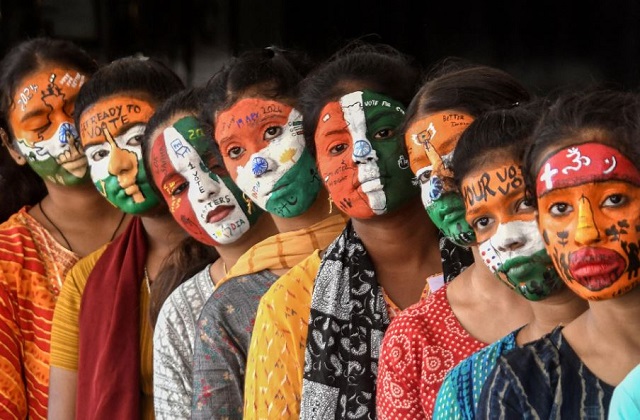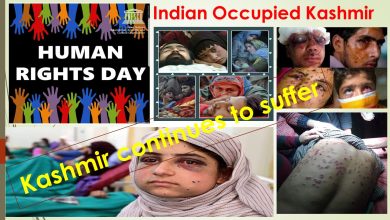Article: Fake News as an Industry: The Threat to Indian Democracy
by Muhammad Wasama Khalid
 Indian voters, grasp the significance: This election transcends political factions. It’s a pivotal moment to safeguard our nation’s essence and uphold democratic ideals
Indian voters, grasp the significance: This election transcends political factions. It’s a pivotal moment to safeguard our nation’s essence and uphold democratic ideals
The proliferation and dissemination of false information, commonly referred to as fake news, has emerged as a formidable challenge to democratic societies worldwide, and India is not immune to its impacts. This phenomenon has evolved beyond simple misinformation; it has morphed into a sophisticated industry with far-reaching consequences for the nation’s political and social fabric.
A recent investigative report by CNA Insider has shed light on a sprawling network comprising 750 counterfeit media entities operating from India. These outlets, spread across 119 countries and utilizing over 550 domain names, underscore the extensive reach and systematic nature of the fake news ecosystem. This organized infrastructure reveals a concerted effort to manipulate information for malicious ends, representing a significant departure from the inadvertent dissemination of false information.
As India braces for the upcoming 2024 elections, the stakes could not be higher. With the ruling Bharatiya Janata Party (BJP) tightening its grip on power and veering dangerously towards authoritarianism, this election may well represent the last chance for Indian democracy to pull back from the brink. The global community watches with bated breath as India’s fate hangs in the balance, recognizing the significance of this pivotal moment in history.
The Bharatiya Janata Party (BJP) has faced scrutiny over its purported utilization of counterfeit news as a political tool. The investigation has pinpointed this network as instrumental in advancing the BJP’s objectives, both domestically and internationally. Disinformation campaigns have been directed at opponents with the aim of shaping public perception in favor of the BJP. This methodical dissemination of fake news poses a threat to democratic processes, as it exploits voters by promulgating fictitious narratives.
The inquiry has uncovered a cadre of freelance content creators who play pivotal roles in this misinformation apparatus. These individuals are contracted to produce propaganda aligned with the agenda of the BJP government. Furthermore, the existence of troll farms dedicated to disseminating hate speech and false information exacerbates the issue. These concerted endeavors underscore the intentional manipulation of online discourse to sway public sentiment.
The repercussions of weaponized fake news reverberate widely and often result in tragic outcomes. Instances such as the lynching of five individuals fueled by unfounded child-kidnapping rumors underscore the potential for real-world violence instigated by misinformation. Moreover, allegations against the BJP suggest the exploitation of religious polarization through the dissemination of fake news, exacerbating divisions between communities. This not only jeopardizes India’s societal cohesion but also fosters an atmosphere of apprehension and coercion.
Journalists delving into the propagation of religion-based counterfeit news encounter threats and coercion. This suppression of journalistic freedom further impedes the dissemination of accurate information and obstructs endeavors to combat misinformation effectively. Navigating a solution that addresses fake news while safeguarding freedom of expression presents a critical and intricate challenge.
Social media platforms, notably Facebook, have played a pivotal role in facilitating the dissemination of fake news across India. Particularly during critical junctures such as elections, the rapid spread of misinformation through platforms like WhatsApp has the potential to escalate communal tensions and violence. It is imperative for the international community, including influential corporations like Facebook, to take decisive measures to combat this pressing issue. Regulatory authorities must hold these platforms accountable for their complicity in amplifying disinformation, particularly when it is geared toward advancing specific political agendas.
The emergence of fake news as a thriving industry in India poses a grave threat to the country’s democratic fabric. The systematic propagation of false information undermines the integrity of democratic processes, fuels social unrest, and suppresses dissenting voices. Effectively addressing this multifaceted challenge necessitates a comprehensive approach. Holding technology giants responsible for content moderation, bolstering independent fact-checking endeavors, and promoting media literacy initiatives are indispensable measures.
Additionally, political entities must commit to upholding ethical standards in their online campaigns, prioritizing the dissemination of accurate information over manipulative tactics. Only through concerted and collaborative efforts can India combat the scourge of fake news and safeguard its democratic principles for the future.
The decline of democracy in India holds implications beyond its borders, impacting regional stability and global democratic values. Upholding democracy in India is not only essential for the well-being of its citizens but also for promoting peace and democratic norms worldwide. Mature leadership and a commitment to democratic principles are imperative for India to fulfill its role as a global democratic leader.
As Indian voters prepare to cast their ballots, they must recognize the gravity of the moment. This election is not merely about political parties; it is about preserving the soul of the nation and reaffirming India’s commitment to democratic principles. The choice is clear: stand against authoritarianism, uphold democracy, and pave the way for a brighter, more inclusive future for India and the world.








